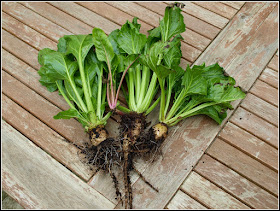I hadn't intended to grow any Perpetual Spinach, but last year three plants of it appeared amongst the Beetroot I was growing. I can only suppose that the seeds got mixed in with the Beetroot ones during packaging. Since these two vegetables are closely related, the seeds look very similar, so it is understandable how this could happen.
Because Jane doesn't like Spinach I don't generally grow it, but I am quite partial to it, so in this case I let the plants grow because I didn't need the space during the Winter. I covered them with some big cloches to protect them from the worst of the weather.
Now however I need the space for planting my Broad Beans, so the Spinach had to be removed. The plants were not yet very big, but they would definitely have got bigger if they had been left. Perpetual Spinach is a biennial plant and although it dies down during the Winter it comes back up again in the Spring, prior to flowering in its second Summer.
This is what I got. It turns out there were actually four plants - three big ones and a little tiddler (see the pink stems).
I said earlier that Perpetual spinach is closely related to Beetroot, and I think this next photo proves that point. Actually, one of the roots looks more like a Parsnip!
The leaves were a bit mottled - not as uniformly green as you would hope, but they were not bad for something that has survived a number of very severe frosts.
I managed to get enough leaves for a one person serving. They shrink dramatically when wilted, so this may look like a lot but it really isn't.
I ate the Spinach in the way I like best - wilted briefly with some butter and black pepper and then served on toast with a poached egg. Very nice!








Yum, that sounds delicious. I do like spinach.
ReplyDeleteI love spinach as well - must have been quite a treat for you considering you don't normally grow it. It does shrink down a lot as you said...I always seem to underestimate how much I need when cooking.
ReplyDeleteIt does shrink down a lot doesn't it. And I love spinach. And chard. Is perpetual spinach the same as what we call chard? It sort of looks like it though your stems are smaller.
ReplyDeleteNo, it's not the same as Chard, although it is closely related. It's actually more like Beetroot. Chard has much thicker stems.
DeleteI wonder if you have grown perpetual spinach before Mark - i presume it's the same as spinach beet - because if you let it, it does self seed. You are probably right that you introduced it as contamination in your seed, but I just wondered….
ReplyDeleteRoger, I did grow Perpetual Spinach once in the past, but it was some years ago. Circumstantial evidence I know, but the ones I described all came up in the neat row of Beetroot. If they were self-seeded I think they would have been "randomised"!
DeleteI like spinach, I also like Kale ..... both green and both full of nutrition.
ReplyDeleteHaving said that there are so many lovely vegetables.
All the best Jan
I never used to like spinach that much (years if sodden masses put me off) but I find it irresistible in a warm salad (stirred in raw so it wilts ever so slightly). Any any bonus crop is good!
ReplyDeleteWe love spinach too and were just considering whether to grow swiss chard or spinanch, before reading your post. I prefer the taste of spinach although it does seem to go to seed quite easily. It all fails there is wild spinach growing close by! Sarah x
ReplyDeleteInteresting plant. It is available in the US under the name perpetual spinach or leaf beet but never got my attention. Given the amount of time and space I waste trying to grow spinach here, maybe I should try it.
ReplyDeleteJust wondered what the texture is like compared to baby spinach? I like my greens real tender and these look kinda rough! lol
ReplyDeleteYou are right. Perpetual Spinach is "robust", compared with the normal types. You wouldn't want to eat any but the smallest leaves raw.
Delete